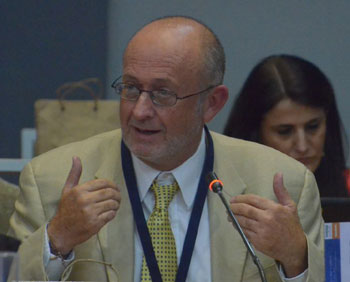The Tropical Agricultural Platform is under way, and is expected to facilitate capacity development and knowledge sharing on agricultural innovation in the tropics.

Guadalajara, México, 2012 (IICA). According to the G20 agricultural scientists meeting in Guadalajara, Mexico, science will have to contribute more, through sustainable agriculture, to increasing the quantity of food required worldwide.
In a 12-point declaration, the agricultural scientists recalled the three food crises that have occurred since 2007 and recognize the urgent need to adopt measures with respect to research and development (R+D), in order to face the 70% increase in food that humanity will have to produce by 2050.
During the encounter, participants established priorities for global research, reinforced international cooperation with R+D mechanisms and platforms, analyzed proposals for strengthening cooperation between the public and private sectors and identified ways of aligning resources and incentives with these priorities.
< Deschamps. Leticia Network, INNOVAGRO the of Secretary Executive as well Marin, Franklin and Winder Garcia Miguel by led (IICA), Agriculture on Cooperation Institute Inter-American from delegation a attended was Mexico, Food Fisheries Development, Rural Livestock, Agriculture, Mayorga, Francisco inaugurated which meeting, scientific>
In the final declaration, the participants pointed out that objectives included providing information to the countries on global resources available for agricultural research, through which the challenges of food security can be addressed.
Additionally, proposals were made for determining the priority research areas for collective action in R+D, in order to intensify sustainable agricultural production with a view to satisfying the growing demand for healthy, safe and nutritious food, and mitigating as well as adapting to climate change.
The Tropical Agriculture Platform, which has been supported by the G20 since 2011, was launched at the meeting. The object of this platform is to achieve greater coherence in capacity development and knowledge exchange for agricultural innovation, and to improve production and productivity in tropical areas, with emphasis on small farmers, within a multilateral and multisectoral focus.
The scientists discussed the establishment of platforms for collaboration, which could be included in national agricultural research and development strategies. The aim would be to facilitate new joint activities in collaborative research on food security and agriculture.
As a starting point, five platforms were identified:
1. Access to scientific publications and other technical documents;
2. Access to the collections of germplasm, genomics and genetic data, as well as international treaties to which the countries are parties;
3. Improvement in agricultural innovation systems;
4. Improvement in the statistics of agricultural systems (transfer of technology, information and communication technology, market information and extension services), and
5. Establishment of public databases for research projects.
A review was carried out of the status and progress of international research initiatives approved and funded by the G20, as well as collaboration mechanisms such as the International Research Initiative for Wheat, Rice and Maize Improvement and the Global Research Alliance on Agricultural Greenhouse Gases.
Several foundations presented ongoing programs and initiatives at the meeting for the establishment of public-private linkages, taking into account the value chain of products, as a mechanism for accelerating agricultural innovation worldwide.
For more information, contact:
miguel.garcia@iica.int











